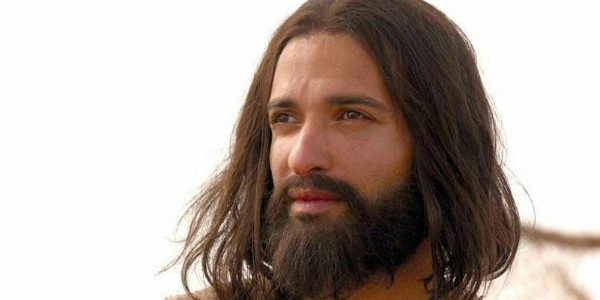I haven’t read Bill O’Reilly and Martin Dugard’s “Killing Jesus,” but I have seen the movie. So, I can’t say if the movie is an improvement on the bestselling historical thriller — but as both “Killing Lincoln” and “Killing Kennedy” diverged from the books that inspired them, one could suspect the same here — but it’s definitely a step down from the Gospels.
As I wrote about here, screenwriter Walon Green tells the story of Jesus (Haaz Sleiman, above) without the supernatural elements, just depicting Him as a controversial rabbi/preacher who upset the political and social order in Roman-controlled First-Century Judea and had to be put to death.
The problem is, if you take out the miracles — the healings, walking on water, bringing people back from the dead and whatnot — it’s hard to understand what the big deal was about this guy. After all, nobody in the Jewish or Roman hierarchy rose up en masse to take down John the Baptist, who ultimately lost his head not for his loud and insistent preaching but for questioning the validity of Herod Antipas’ marriage — an issue of politics and a woman’s ego more than theology.
But then, John didn’t raise little girls or Lazarus from the dead, he didn’t publicly heal lepers and paralytics, and he didn’t walk around claiming to be the Son of the Living God.
Instead, in “Killing Jesus,” the would-be Messiah just becomes a nice guy who says some nice things, saves an adulterous woman from being stoned, and doesn’t seem to be quite sure what He is until Simon Peter informs Him that He’s divine.
He still delivers a compelling message of love, but given what we have to work with in “Killing Jesus,” crucifixion seems like an overreaction.
And bizarrely, in a story that’s supposed to focus on the cultural and political impact of Jesus, Barrabas is left out entirely. Considering he’s widely thought to have been a Zealot, and that the choice presented to the crowd between him and Jesus was an annual political move by Roman governor Pontius Pilate to keep peace among the populace in Jerusalem during Passover, it’s a puzzling omission.
In the end, Jesus was crucified not because he preached love but because he worked inexplicable miracles — challenging not just the religious hierarchy but the very foundations of Jewish theology — because the turmoil that caused among the Temple priests meant trouble for Roman authorities, and because He was, and said He was, the Son of God.
People can choose not to believe that, but if you suck the supernatural out of the story of Christ, he ceases to be Christ. You wind up with a bloodless tale that may be acceptable to skeptics but seems truncated to believers. In refusing to commit to telling the full story of Jesus, the producers of “Killing Jesus” do themselves and their audience a disservice.
They wound up with a movie that tells an incomplete story to those not familiar with the Gospels, and an equally incomplete story to those that are.
But, aside from some unfortunate wigs and beards, it’s a generally handsome production, filmed in Morocco, home to many a Biblical epic these days. Sleiman, born in the United Arab Emirates and raised Muslim in Lebanon (he now says he’s “spiritual”), does a credible job, despite the irony of being a Middle Eastern actor surrounded by almost entirely by Americans, Brits, Welshmen and Irishmen playing Jewish kings, priests and apostles.
In the end, “Killing Jesus” may have done better to lean on the history rather than the drama.
In “Killing Lincoln,” Tom Hanks appeared as an on-camera narrator to provide the historical background that served as the connective tissue between dramatic sequences. There’s a bit of that at the end of “Killing Jesus,” narrated by Kelsey Grammer, who plays King Herod (in a huge grey wig and whiskers that must be seen to be believed).
At that point, I thought the whole thing could have benefited from Grammer filling a role more like Hanks’, offering documentary segments that explored the milieu into which Jesus was born and explained the beliefs about His divinity, rather than stretching a severely edited version of the Gospels over three hours of screen time.
Next up in the annual Easter brigade of religious productions is CBS’ “The Dovekeepers,” on March 31, a female-centric story of Masada from producers Mark Burnett and Roma Downey. I haven’t received a screener for that one yet, but I do have the first two episodes of “A.D. The Bible Continues,” also from Burnett and Downey, premiering Easter Sunday, April 5, on NBC.
Watch this space for interviews from both, and an “A.D.” review.
Image: Courtesy National Geographic Channel














